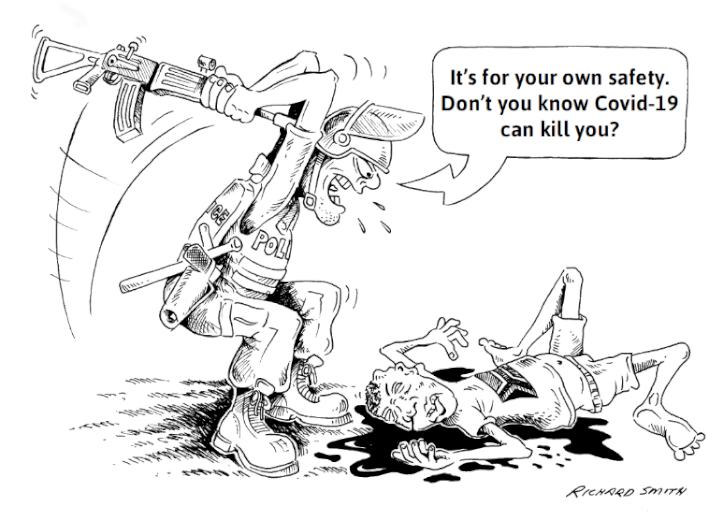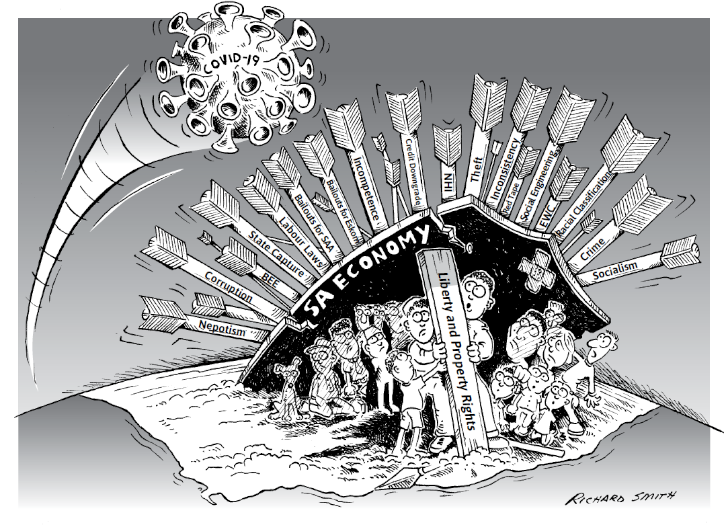FMF COVID-19 Hub
(continuously updated)
The Free Market Foundation (FMF) has promoted and fostered an open society, the Rule of Law, personal liberty, and economic and press freedom since its founding in 1975. The current global outbreak of COVID-19 (the novel coronavirus) is no exception. The FMF is deeply concerned about the overly intrusive and restrictive measures the South African government, and other governments, have unleashed upon their populations.
The economic impact of the so-called national lockdown will be dire, particularly for South Africa’s poor, ten million of whom were unemployed before the disaster began. The arbitrary designation and thus closure of many businesses deemed “non-essential” will for many years haunt the economy. The constitutional rights and civil liberties of all South Africans are on the line.
CONTENTS
Media releases
Reports, submissions, and papers
Articles and op-eds
Television and radio interviews
Audio/visual media
MEDIA RELEASES
Government must not devastate the informal sector
“The economic impact of COVID-19 is extremely problematic. Most formal businesses can afford survival measures, such as bridging finance, increased sanitation, and work distancing to curb the spread of infection and protect themselves, their employees, and clients. However, entrepreneurs in the informal economy, who are struggling to survive from day to day in our ailing economy, cannot afford measures to protect their health.”
Also published on African Liberty and Automotive Business Review.
COVID-19 highlights the critical need for more spectrum to lower cost of data
“Data usage has sky-rocketed since the COVID-19 crisis, and now the lockdown, began. It has reignited misinformed howls of rage that data in SA in too expensive. MNOs are struggling to cope with the massive surge in demand yet, unlike in nearly all other competitive sectors, they have not increased data prices. Far from MNOs being victimised by the CompCom and public pressure, they should be nurtured during and after the crisis.”
Also published on MyBroadband, ITWeb, IT-Online, and Polity.
Beware benign interpretation of government power in times of crisis
“Government action, which occurs against the background of a national disaster or emergency can always be made to appear essential to the wellbeing of the people, and therefore benign. The tendency of government to invade the liberty of the individual in these circumstances appears justified for the limited purpose for which it is done. There is, of course, always more than a hint of truth in the official position and this is what makes it potentially sinister. COVID-19 is a singular example of this process. The inevitable result is that the people become complacent.”
Also published on Automotive Business Review.
REPORTS, SUBMISSIONS, AND PAPERS
Economic Freedom in a Time of Crisis: An FMF proposal to National Treasury
Jacques Jonker and Jasson Urbach
“The Free Market Foundation is of the view that the detrimental consequences of government’s response to the outbreak can be largely mitigated. These measures will take political will but are guaranteed to lessen the impact of COVID-19 on South Africans’ wallets and economic prospects. As such, the Free Market Foundation has answered National Treasury’s call for proposals on how it could go about its own response to COVID-19, by outlining 12 simple and to the point recommendations.”
ARTICLES AND OP-EDS
Comply with the lockdown, but don’t judge those who don’t
Martin van Staden
“Those of us who might be inclined to be judgmental, often find ourselves in spacious homes. We must appreciate that nobody is to blame for the presence of COVID-19, and that we should be careful in judging peaceful people for going about their daily lives and not adhering to the regulations.”
Published on Business Brief.
Government should beware of inadvertently taking lives in its attempt to save them
Jacques Jonker
“It does not make sense to implement a nationwide lockdown to save lives when that same lockdown prevents people from generating a livelihood for themselves. We must fight against the virus but we must do it in a manner that will not worsen an already dire situation and, quite possibly, lead to even more lives being lost than would have been the case had people been allowed to care for themselves.”
Also published on Automotive Business Review, Business Brief, and Gay Pages.
Post-Covid-19 SA will need a natural ‘stimulus package’
Sindile Vabaza
“South Africa’s government will have to make brave and tough choices, including a natural stimulus package of income, VAT and corporate tax cuts, reduced government spending, as well as drastic deregulation of the labour regime.”
Published on City Press.
Right now it is overkill to require network providers to infringe our right to privacy
Martin van Staden
“Under the present circumstances, it is overkill to conscript cellphone service providers — private companies — into government service by requiring them to infringe on our right to privacy. There is no good reason for the government to know where we are or what we are up to. If you are concerned about your privacy, it might be worthwhile switching off your cellphone’s location service, or alternatively switching your cellphone off altogether.”
Published on BDLive.
Die COVID-19-afsondering: juridies en prakties gedoem
Martin van Staden
“Regsgesproke het ons onbekende waters betree. Dit is dus miskien verstaanbaar dat die regering besig is om verkeerd te loop. Ook, in die praktyk kan die koronavirusregulasies nie nagekom word in ‘n samelewing soos dié van Suid-Afrika nie. Wat ook al die geval mag wees, die koronavirusregulasies moet grootliks tersyde gestel word en vervang word deur minder beperkende maatreëls om die pandemie te beheer.”
Published on Solidariteit.
Is locked-down SA a frog in the warming COVID-19 pot?
Rex van Schalkwyk
“The philosophical question is whether it is justified to treat 99% of the population as though they belong to the criminal 1%, and whether, in pursuit of the criminals, society does not surrender more than could be justified by any of the successes that might be achieved.”
Published on BDLive.
COVID-19: Consider the unintended consequences of the lockdown
Chris Hattingh
“Street traders and people who try to run shops in informal settlements are just some who will be most devastatingly affected by the current nationwide lockdown. Countless South Africans live hand to mouth, because of ridiculous regulations that persist 25 years into democracy making it very difficult for them to subsist.”
Also published on African Liberty, IT-Online, Automotive Business Review, Property24, SAHomes4Sale, and SureLetting.
Staat bly onderhewig aan die Grondwet en oppergesag van die reg
Jacques Jonker
“Onder andere, verg die oppergesag van die reg dat alle wette en regulasies wat in plek gestel word nie arbitrêr mag wees nie, dat dit duidelik genoeg is vir die algemene persoon om te verstaan, en dat enige diskresionêre magte ingeperk word deur duidelike, objektiewe kriteria. Die doel van hierdie imperatiewe is om te verhoed dat die regering onregmatige beperkinge instel op individuele vryheid en in die proses sy mandaat oorskry.”
Also published on Maroela Media.
Beware the constitutional void during the lockdown
Martin van Staden
“Officially and on paper, the supremacy of the Constitution has gone unaffected, but if in practice we cannot set the process in motion to realise and operationalise the provisions of the Constitution, then constitutional supremacy offers cold comfort to those whose rights have been infringed. Many of the measures that government has instituted to curb the spread of the coronavirus and the surrounding panic are justifiable. In some ways, the South African government has outperformed its counterparts around the world. But sections 1(c) and 2 of the Constitution declare unequivocally that the Constitution and the Rule of Law are supreme – overriding all other considerations – and that any laws or conduct that are inconsistent with it are void and unconstitutional.”
Also published on Accounting Weekly, BusinessBrief, and Automotive Business Review.
Steps the government can take to help the economy survive COVID-19
Jasson Urbach
“It is scandalous that the government continues to bail out and subsidise state-owned entities (SOEs) that compete directly with private enterprises and consume billions of rand in taxpayer resources. This money could be used to directly assist the poor. It could purchase health-care services and products for them from privately competing companies to assist with the inevitable fallout from the coronavirus pandemic.”
Also published on BDLive, BizNews, Head Topics, and Times Select.
We can ill afford to play fast and loose with civil liberties
Martin van Staden
“Our understanding and acceptance of the principle that the same rules that ordinarily apply do not necessarily apply in crises, should not mean that civil libertarians and constitutionalists can let their guard down. In fact, those who are committed to the primary purpose of the constitution and of constitutionalism — to define and limit the extent of government’s power over our lives — must be at their most vigilant during crisis situations. Even now, we must question whether the impositions of the coronavirus regulations are appropriate or justified.”
Also published on BDLive.
COVID-19 is no excuse for spendthrift policies
Mpiyakhe Dhlamini
“If the economy continues to deteriorate, the standard of living will continue to decline, well into the future, for future generations. The interventions we need right now are to double up on reform, abandon all loss-making, capital-destroying state-owned enterprises and remove regulations that hamper small businesses, which are the most agile first responders to any crisis. By submitting a special bill in Parliament, a greater cut in spending could be introduced – the objective being to attain a budget surplus as soon as possible in these uncertain times.”
Also published on City Press.
How legislation could hamper the response to coronavirus
Martin van Staden
“Since the National Health Act was enacted, the supply of healthcare capacity has been kept lower than it could have been today. This might prove devastating for those who are particularly vulnerable to the coronavirus, should the virus start spreading uncontrollably in South Africa. The South African government and public need to face an incredibly uncomfortable reality: government is not competent to engage in central planning. The failure to face this reality has been detrimental to all South Africans and will be particularly detrimental to the most vulnerable in this context: the elderly and those with pre-existing conditions.”
Also published on BizNews.
TELEVISION AND RADIO INTERVIEWS
Post COVID -19 how will the economy look
Leon Louw, 8 April 2020, SAfm
SAL & die effek van die coronavirus op die ekonomie
Leon Louw, 30 March 2020, RSG
AUDIO/VISUAL MEDIA
Podcasts/vlogs
COVID-19: A view from the UK & potential impact on global trade
Chris Hattingh and Alexander Hammond
COVID-19 update, privacy concerns, & the best policies for SA going forward - Free Marketeers
Chris Hattingh, Sindile Vabaza, and Jacques Jonker
The COVID-19 lockdown does not justify lax citizenship - Free Marketeers
Jacques Jonker, Chris Hattingh, and Martin van Staden
COVID-19 update and repo rate cut - Free Marketeers
Martin van Staden, Mpiyakhe Dhlamini, and Chris Hattingh
COVID-19 impact and SAX business rescue - Free Marketeers
Mpiyakhe Dhlamini, Chris Hattingh, and Jacques Jonker
Cartoons

